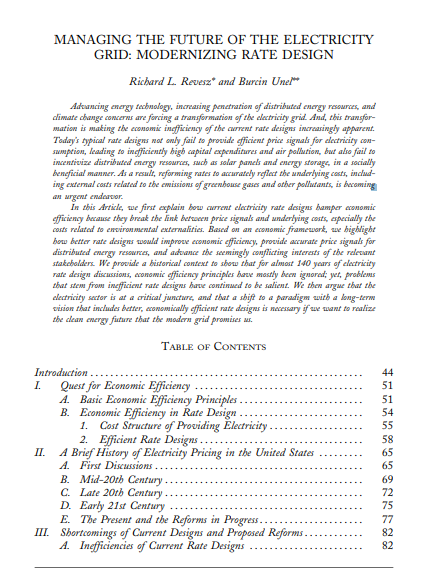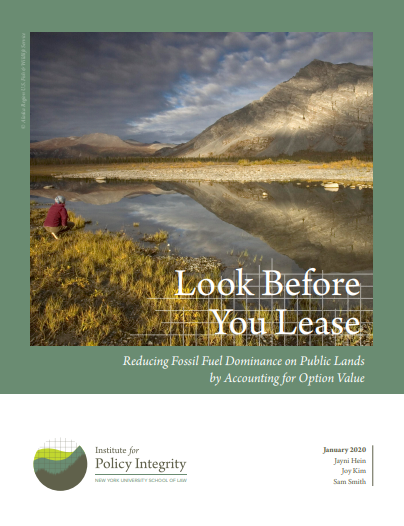-
Fuel-Economy Standards, Corporate Penalties, and a Very Costly Rollback
The mistake of setting corporate fuel-economy penalties just a little too low can be magnified by automakers’ decisions to produce millions of cars with worse fuel-economy. And the Trump penalty appears to be way too low to motivate compliance. Here’s a breakdown of the reduced penalty and how it will likely affect cars, consumers, and our climate.
-
Comments on Connecticut’s Study of the Value of Distributed Energy Resources
Connecticut’s Department of Energy and Environmental Protection (DEEP) and Public Utilities Regulatory Authority (PURA) are conducting a study to determine how it can best compensate distributed energy resources, like solar panels and residential battery installations, which can provide provide significant value to the grid. DEEP and PURA’s study involves an electric system dispatch simulation model and various DER technology use cases. We submitted comments on the model’s outputs and how they can be improved to better serve the study.
-
Comments to DOE on Energy Conservation Standards for Refrigerators and Freezers
The Department of Energy requested input on its analysis of energy conservation standards for consumer refrigerators, refrigerator-freezers, and freezers. We submitted comments encouraging DOE to, as it has in the past, monetize the full climate benefits of greenhouse gas emission reductions.
-
Our Work on State Zero-Emission Credits Programs
Several states have determined that ensuring the viability of zero-emission electricity generation from nuclear power is critical to mitigating the impacts of climate change especially in the short term while states work to meet aggressive new clean energy goals. Through comments and amicus briefs, we’ve been involved in those efforts in both New York and New Jersey.
-
Managing the Future of the Electricity Grid: Modernizing Rate Design
This article, published in the Harvard Environmental Law Review, argues that the electricity sector is at a critical juncture, and that a shift to a paradigm with a long-term vision that includes better, economically efficient rate designs is necessary if we want to realize the clean energy future that the modern grid promises us.
-
Comments to EPA on Water and Air Pollution Limitations from Electric Power Generation
The Environmental Protection Agency (EPA) proposed to weaken technology standards adopted in 2015 that act as crucial controls on effluent and emissions from electric power generation. Our comments focus on EPA’s flawed legal and economic justifications for the proposed rule, which contravenes the Clean Water Act, creates harmful incentives to delay compliance with guidelines, and relies on flawed cost-benefit analysis. We also submitted joint comments that detail how EPA severely undervalues the proposed rule’s climate costs and must monetize the full social cost of carbon using the best available data and methodologies.
-
Comments to EPA’s Chartered Science Advisory Board
We submitted four comments in advance of the Environmental Protection Agency’s (EPA) January 2020 meeting of its Chartered Science Advisory Board (SAB).
-
Look Before You Lease
Reducing Fossil Fuel Dominance on Public Lands by Accounting for Option Value
While the Trump administration’s goal of “energy dominance” has increased the public lands available for oil and gas development, no effort has been made to modernize the leasing system, even in the face of climate change. Our report explains how option value—which accounts for the informational value gained by delaying leasing decisions—can and should be factored into the Bureau of Land Management’s land use planning processes. Accounting for option value at multiple stages of the land use planning process would significantly improve BLM’s public lands stewardship, better protect the environment, and regain some of the economic and strategic advantages it has ceded to private developers. The report also describes case studies where BLM’s failure to consider option value has led to costly litigation and missed opportunities.
-
Comments to FERC on Putnam Expansion Project
The Putnam Expansion Project involves the construction and installation of natural gas infrastructure that will result in downstream emissions of approximately 3.26 million metric tons carbon dioxide-equivalent each year. Our comments to the Federal Energy Regulatory Commission (FERC) focus on its environmental assessment of the project, which provides unclear and inadequate analysis of the emissions and their climate impacts. We urge FERC to monetize climate damages by using social cost of greenhouse gas metrics.
-
Comments to DOE on Energy Conservation Standards for Fluorescent Lamps
The Department of Energy proposed to not increase the efficiency of fluorescent lamp ballasts. We submitted comments noting that DOE fails to analyze the forgone emissions reductions of its proposed determination.
Viewing recent projects in Climate and Energy Policy











